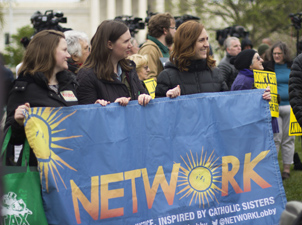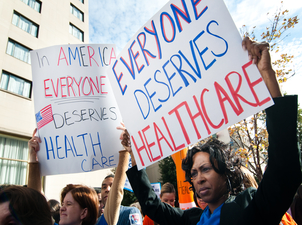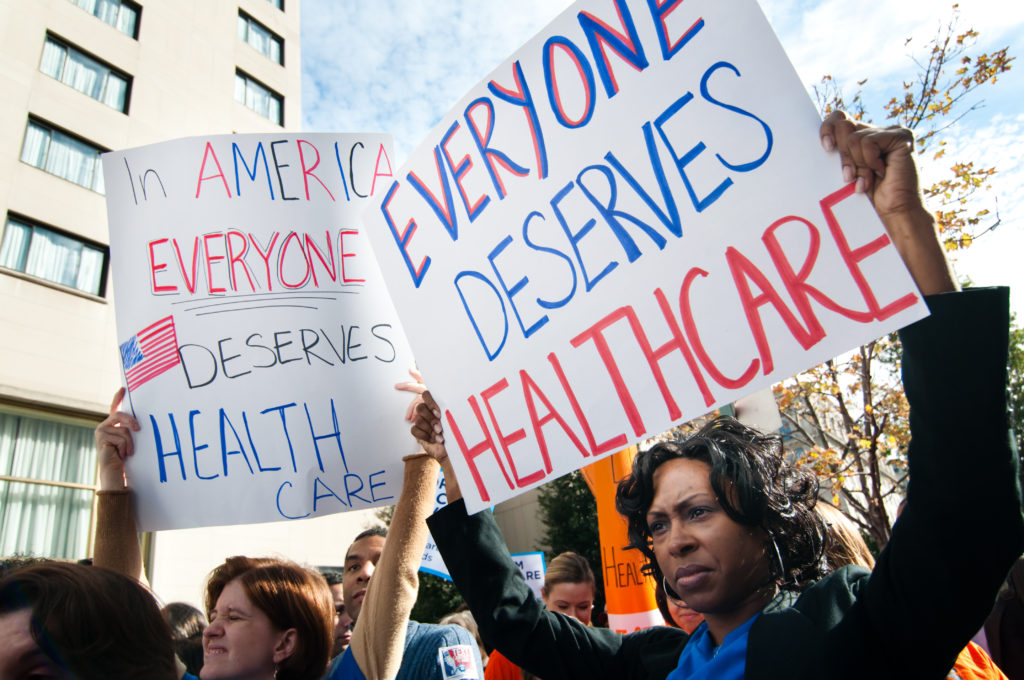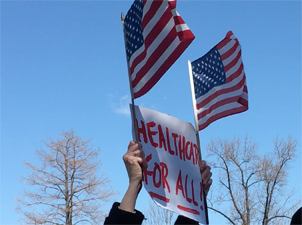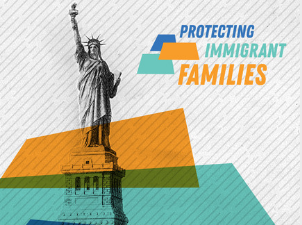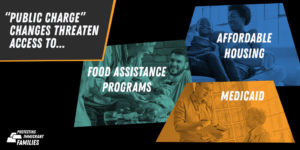
How To Organize During a Pandemic
Alex Burnett
May 27, 2020
Recently, journalists have written extensively about the anti-lockdown protests gripping our nation. During the past month, The New York Times published at least 15 stories about anti-lockdown protesters, highlighting their propensity to carry assault weapons, flaunt social distancing, display Confederate flags, and secure funding from prominent conservative donors. This reporting is crucially important, especially since many of these demonstrators espouse white supremacist rhetoric and actively participate in neo-Nazi organizations, like The Proud Boys.
Despite its significance, this reporting can eclipse stories about progressive activists who are struggling for a socially just COVID-19 response. Workers in at least 7 states organized strikes involving more than 1,000 people in March and April, but the media largely ignored their historic organizing and instead focused primarily on the anti-lockdown crowd.
In this blog post, I want to highlight some progressive activists—specifically, The Poor People’s Campaign (PPC) and National Nurses United (NNU). Both NNU and PPC are building grassroots support for a COVID-19 response that advances racial and economic justice, while recognizing we cannot “return to normal” if this pandemic abides. By demanding immediate COVID-19 relief alongside permanent systemic change, PPC and NNU are demonstrating how other justice-seekers can effectively organize during the coronavirus lockdown.
The Poor People’s Campaign: Working Towards a “New Normal”
A national coalition led by Rev. Dr. William J. Barber II and Rev. Dr. Liz Theoharis, The Poor People’s Campaign quickly recognized why coronavirus hit the U.S. remarkably hard. The PPC condemned the federal government’s “reckless and uncoordinated response,” but maintained, “The current emergency…results from a deeper and much longer-term crisis”—the “evils of racism, economic exploitation, and militarism,” described by Dr. Martin Luther King, Jr. in May 1967. To fully address the COVID-19 crisis, the PPC argued that the U.S. must eliminate racism, poverty, and our environmentally destructive wartime economy.
Approximately 50 years after Dr. Martin Luther King, Jr. led the Poor People’s March on Washington, Dr. Barber revived Dr. King’s efforts at building a mass, multiracial movement of working-class people intent on transforming American society. Since 2017, the PPC organized 43 state committees, comprised of low-income people and faith leaders, lobbied federal and state policymakers around their Moral Agenda, and coordinated civil disobedience nationwide. With support from dozens of social justice organizations, including NETWORK, the PPC is now turning their attention to the COVID-19 crisis, hoping to bring the kind of pressure that many lawmakers haven’t felt since the 1960’s civil rights revolution.
To accomplish this ambitious goal, the PPC is working closely with local organizers, explained Adam Barnes, who coordinates the PPC’s faith partnerships and The Rights & Religions Program at The Kairos Center for Religions, Rights, and Social Justice. Since January, the PPC mobilized its members to support local responses to the COVID-19 crisis—including rent strikes, mutual aid networks, workplace walkouts, and anti-hospital closure demonstrations. These expressions of “non-cooperation,” Barnes emphasized, are faithful responses to the coronavirus pandemic. Since half the U.S. population lived in poverty before coronavirus eliminated a single job, the PPC believes these actions are urgent.
Crucially, the PPC’s local organizing amplifies their national advocacy. On April 3rd, the PPC sharply criticized COVID-19 relief legislation for funneling trillions of federal dollars into investment banks without guaranteeing healthcare, income, and housing for all Americans. To bolster their message, the PPC organized a National Week of Action, scheduled for May 21st (5/21). On May 21st, justice-seekers can call or email Senate Majority Leader Mitch McConnell and House Speaker Nancy Pelosi and ask them to support the PPC’s Moral Agenda and COVID-19 demands, which would provide immediate COVID-19 relief and reduce racial and economic inequality. Additionally, as part of this week of action, religious communities can host special services amplifying the PPC’s message and mourning the 250,000 people killed by poverty each year. Click here to learn more about the May 21st week of action.
Much of this activism is building towards the PPC’s Mass Poor People’s Assembly and Moral March on Washington. NETWORK is proud to join the Poor People’s Campaign as a mobilizing partner for the Mass Poor People’s Assembly and Moral March on Washington Digital Justice Gathering, on June 20, 2020. At this historic event, which PPC organizers hope will be the largest digital gathering of low-income people in U.S. history, PPC speakers will denounce what “normal” looked like before the pandemic—140 million people living in poverty, an irredeemably racist criminal justice system, widespread voter suppression in communities of color, and unsanitary deportation camps, which separate immigrant families. After offering solutions to these “normal” problems and the COVID-19 crisis, PPC speakers will help participants develop plans for building grassroots power in their communities. To RSVP for the PPC’s June 20th event, click here.
“We’ve seen how broken our system really is,” Adam Barnes told me. “I can guarantee you that the people in power are going to push for us to ‘return to normal,’ but this is a chance for us to do things differently.” Adam is right. By supporting innovative groups, like NNU and the PPC, we can struggle for a solution to this crisis that pushes us towards something better than “normal.” Hopefully, it will resemble justice.
National Nurses United & The Long Struggle for Health Justice
The largest labor union of registered nurses (RNs) in the United States, National Nurses United responded to COVID-19 months before it dominated headlines. On January 30, 2020, NNU sent a letter to the World Health Organization (WHO), which demanded better COVID-19 protections for healthcare workers. By mid-March, the union had lobbied most federal health agencies, spoken with dozens of Members of Congress, and organized a national day of action, in which thousands of nurses demanded more personal protective equipment (PPE) and coronavirus testing. Crucially, NNU emphasized that our nation’s broken healthcare system was not prepared for a pandemic requiring mass testing and hospitalization. According to a March 2020 NNU analysis covering 48 states, over 70% of hospitals did not have sufficient PPE or a plan for treating COVID-19 patients.
Over the next 2 months, NNU continued pressuring policymakers and employers to prioritize people over profit in their coronavirus response. Besides demanding the Cook County Department of Corrections release incarcerated people from jails and prisons, NNU continually stressed that COVID-19 disproportionately harms low-income people of color. With these stakes in mind, nearly 100,000 NNU nurses organized May Day actions across 13 states, during which they called on the Occupational Health & Safety Administration (OSHA) to better protect healthcare workers and their patients. Most recently, NNU brought the heat to the White House, where nurses coordinated a vigil-protest honoring 88 recently deceased nurses.
NNU’s flurry of activity offers a model for progressives interested in organizing during the coronavirus lockdown. By combining digital actions, vigils, and confrontational protests, NNU created many avenues for participation, leading to remarkably high levels of turnout. Additionally, NNU did not limit their demands to one branch of government or a single negligent employer. Through pressuring federal and state policymakers alongside the private sector, NNU demonstrated that our entire healthcare system bears responsibility for the harm wrought by coronavirus. A longtime advocate for safe staffing levels and patient protections, NNU was ideally positioned to make this clear.
To learn about upcoming NNU actions, visit their website.












